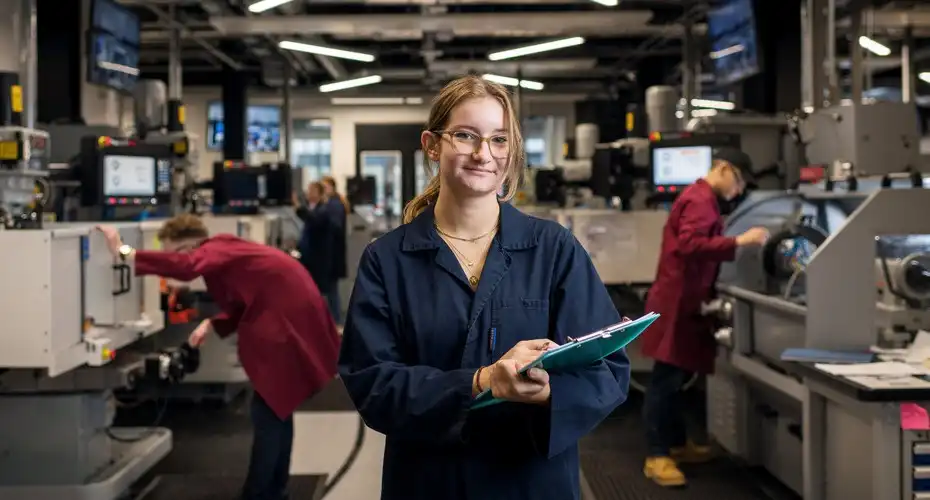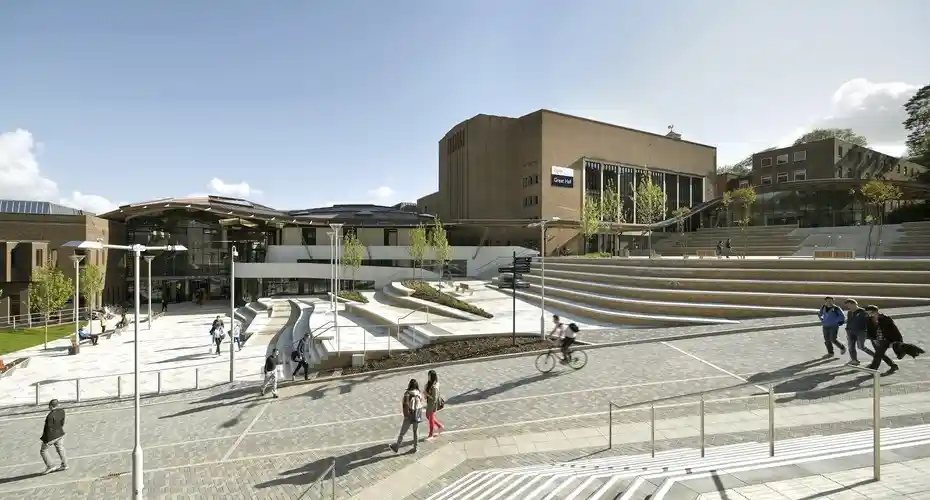| Degrees |
|
|---|---|
| Duration |
| Start date | September, January or April |
|---|---|
| Locations | Streatham Campus
Penryn Campus |
| Study modes | Full time or part time |
Overview
Mathematics and Statistics brings together our internationally leading research in several areas of pure mathematics, applied mathematics and statistics, including number theory, arithmetic geometry, geophysical and astrophysical fluid dynamics, dynamical systems, control theory, statistical forecasting and uncertainty quantification.
Our research has a strong focus on important applications in fields such as climate science, systems biomedicine, engineering, ecology, epidemiology and natural hazards. A summary of our main areas of research focus and current research projects as well as some current PhD research opportunities can be found on our department website.
We are one of only four UK universities to enjoy an academic partnership with the Met Office.
Contact
Web: Enquire online
Phone: 0300 555 6060 (UK)
+44 (0)1392 723044 (non-UK)
![]()
Research expertise in climate modelling and statistics; control and dynamics; systems biology; astrophysical fluid flows and number theory
![]()
Top 25 in the UK for Mathematics
22nd in the Complete University Guide 2026
![]()
Top 10 in the world for our Mathematics and Computer Science research
CWTS Leiden Ranking 2024, by percent of articles in the top 10% most-cited
![]()
Wide range of exciting and high-impact research projects
![]()
Research expertise in climate modelling and statistics; control and dynamics; systems biology; astrophysical fluid flows and number theory
![]()
Top 25 in the UK for Mathematics
22nd in the Complete University Guide 2026
![]()
Top 10 in the world for our Mathematics and Computer Science research
CWTS Leiden Ranking 2024, by percent of articles in the top 10% most-cited
![]()
Wide range of exciting and high-impact research projects
Research overview
- Pure mathematics - Our research centres on number theory, arithmetic geometry, analysis and dynamical systems.
- Geophysical and astrophysical fluid - Our research centres on theoretical fluid dynamics and numerical modelling with applications to atmospheres, oceans, magnetic fields and solar physics.
- Systems, dynamics and control - Our research centres on control theory, dynamical systems and complex systems with applications to biology, medicine and engineering.
- Environmental Mathematics - Our research in dynamical systems, control theory, and data science applies to sustainability, ecology, epidemiology, human health, renewable energy, innovation and business.
- Living Systems Mathematics - We undertake mathematical research with applications to biology and medicine.
- Climate dynamics - Our research centres on modelling the climate system and on quantifying and reducing uncertainties in climate projections.
- Statistical and Data Science - Our research centres on stochastic modelling, forecasting and uncertainty quantification with applications to the environment, health and decision support.
Many members of staff and research students are involved with one of the Department's three research centres:
- Centre for Systems, Dynamics and Control is a focus for interdisciplinary research on the modelling of complex systems, dynamical systems, control theory and their applications in life and physical sciences. Our research is divided into three overlapping themes: Living systems, Dynamical systems and Complexity and control.
- EPSRC Hub for Quantitative Modelling in Healthcare works in collaboration with internationally leading clincal research groups in diabetes, microbial and mental health.
- Exeter Climate Systems is a research centre created in 2007 that provides a community focus for staff within the Department of Mathematics and Statistics who are working on weather and climate related applications. Mathematics and statistics play a crucial role in weather and climate science by providing essential tools for addressing key problems (e.g. the formulation and implementation of numerical models required for prediction, optimal methods for using data, etc.). In turn, weather and climate science pose fascinating and pressing problems that have helped to stimulate the development of new mathematics and statistics.
Many Mathematics staff are also involved with the following institutes:
How to apply
Entry requirements
Applicants should hold, or expect to obtain before starting, an undergraduate or postgraduate degree in mathematics, statistics, or other relevant subject with a high level of mathematics. Undergraduate degree classifications should be equivalent to a First or strong Upper Second. Please indicate in your application which of our research groups or members of staff you are interested in working with.
Requirements for international students
If you are an international student, please visit our international equivalency pages to enable you to see if your existing academic qualifications meet our entry requirements.
English language requirements
International students need to show they have the required level of English language to study this course. The required test scores for this course are as follows:
- MPhil/PhD Mathematics and MSc by Research Mathematics courses on Streatham Campus fall under Profile A.
- MPhil/PhD Mathematics and MSc by Research Mathematics courses on Penryn Campus fall under Profile B2.
- PhD Complex Living Systems courses fall under Profile B2.
- PhD Natural Sciences courses fall under Profile E.
PhD and Research Programme application process
The information below applies to self-funded PhD, MPhil and Masters by Research applicants, but if you are applying for a funded PhD studentship, please follow the specific instructions related to that application.
- Pinpoint your PhD research area
- Investigate whether this area is available at Exeter
- Ensure that you meet our English language entry requirements (international students only)
- Construct and refine your PhD research proposal
- Approach your potential supervisor(s)
- Apply online
PhD studentships pages can be accessed in our Funding lists on Finance tabs under each research topic page, and are also available from the Postgraduate Research search results pages on this site, on the PhD projects tab.
Full details of the application process can be found on our Apply now webpage.
Fees and funding
Tuition Fees per year 2025/26
- Home: £5,006 full-time; £pro-rata part-time
- International: £26,500 full-time
For those studying for more than one year, our fees are expected to increase modestly in line with Consumer Price Inflation measured in December each year. More information can be found on our Student Finance webpages.
Tuition Fees per year 2024/25
- Home: £4,786 full-time; £pro-rara part-time
- International: £25,500 full-time
For those studying for more than one year, our fees are expected to increase modestly in line with Consumer Price Inflation measured in December each year. More information can be found on our Student Finance webpages.
Our Postgraduate Funding webpage provides links to further information. If you are considering a PhD in the future, in addition to University of Exeter funding, we have been successful at securing postgraduate funding for PhD research through our Funded centres.
Current available funding
Supervision
You can expect:
- High-quality research supervision to develop and nurture your potential
- A tailored supervision approach to help best suit your requirements
- Accessible supervisors who are enthusiastic about working directly with postgraduate research students
- Regular timetabled meetings with your supervisor
- 'Open door' policy to all postgraduate students - instant access to world-leading researchers who will share their expertise and ideas with you
- Regular meetings with your supervisory team, other members of your research group, and mentors
You will only be able to pursue a research degree with us if we can offer appropriate supervision. Your supervisors will provide the necessary support and guidance and so need to have expertise in your chosen research field. You may join a research team or work with specific members of staff.
We strongly recommend that you informally approach your potential supervisor(s) with your research proposal before submitting a formal application to study. This will enable you to find out if they feel they would be able to supervise you and whether they believe your research proposal needs further refinement.
Visit our how to apply page for detailed information on the application process.
Facilities
The Faculty of Environment, Science and Economy has excellent teaching and research resources and has recently invested £2.8 million to provide new academic and social facilities. You will have access to our fully-equipped research centres, comprehensive laboratories and workshops and computer facilities including wireless networking in most areas.
The excellent computing facilities are based around a Unix/Linux system networked to the University computer system. We have our own supercomputing facility built around a Beowulf cluster which is used, for example, by students modelling astrophysical and geophysical fluid flows. The college has a brand new study area with core texts for courses, individual rooms for study groups to meet, and wireless connection for laptops and LCD TVs to display presentations.
The working environment for postgraduate students is friendly and welcoming: each research student has a desk in a shared or open plan office equipped with a networked computer terminal. We provide training in research methodology and in relevant computer software, bibliographical resourcing and mathematical word-processing. You will have access to state-of-the art facilities for remote collaboration and advanced PhD training via the APTS and MAGIC consortia.
I chose to do my PhD at Exeter because of the strong interdisciplinary collaboration within the university and its links to external bodies such as the UK Met Office and the World Health Organization.
For me, studying for a PhD represents a vast change from taught education, becoming a producer rather than a consumer of knowledge and expertise. Over the last two years I have attended training courses, presented my work at conferences and gained valuable experience teaching undergraduates.
Oliver
PhD Mathematics, 2022
Careers
Our graduates enter a wide variety of fields where their analytical skills are valued both in business and in the public sector. Our postgraduates benefit from strong links and active collaboration with external organisations such as the Met Office in Exeter; one of the UK’s major users of advanced mathematics and statistics.
We have an excellent reputation with graduate recruiters and our students compete very successfully in the employment market. In addition to the College’s Employability Officer, Career Zone gives access to a wealth of business contacts, support and training as well as the opportunity to meet potential employers at our regular Careers Fairs.
Postgraduate research students can access our Postgraduate Researcher Development Programme, which covers a range of topics to help you complete a successful research degree and acts as a springboard for your research career.
Graduate destinations
Below are some examples of initial employment titles and employers of Mathematics postgraduates who have studied with us in recent years.
Please note that, due to data protection, the job titles and organisations are listed independently and do not necessarily correspond.
| Job Title | Organisation |
|---|---|
| Assistant Research Fellow English teacher Graduate Trainee Lecturer Lecturer in Mathematics Ocean Observations Scientist Post Doc Researcher Postdoctoral Research Postdoctoral researcher Quantitative analyst Senior Data Scientist Statistician Technical Analyst Technical Writer Visiting fellowship |
Aeon Bristol Water Carnegie Institution for Science Contiamo GmbH European Centre for Medium Range Weather Prediction Exeter College Flextrade Gdansk University of Technology, Poland Indian statistical institute, bangalore Met Office National University of Ireland University of Edinburgh University of Exeter |











